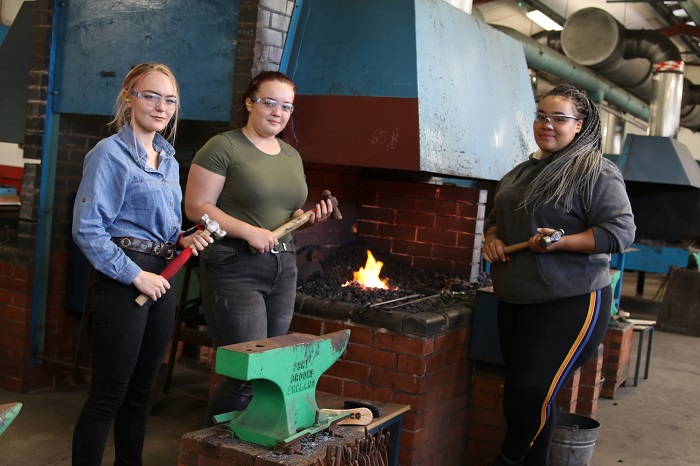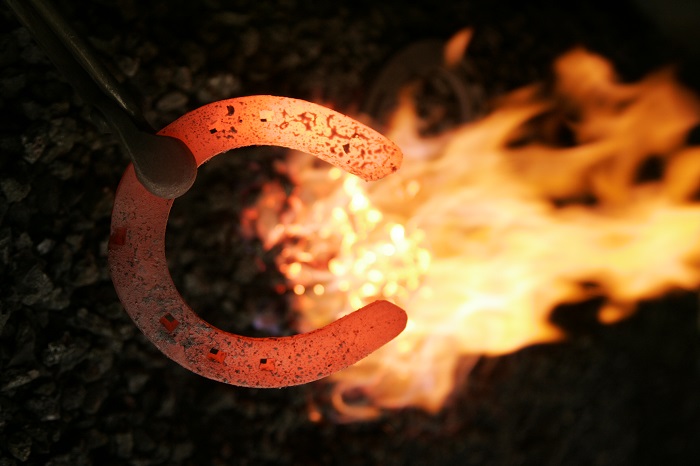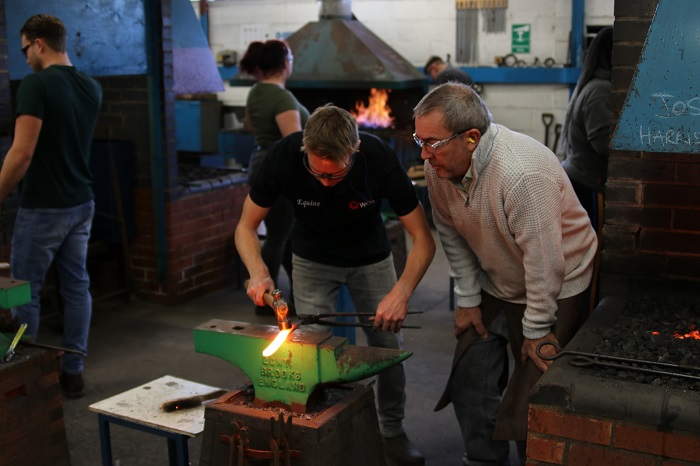Posted: 9th October 2018 | Back to news feed

Most students returning back to full-time education after the summer holidays will be back in the traditional classroom, pen and textbook in hand. Not so for the new batch of trainee farriers at Moreton Morrell, Warwickshire who have swapped pen for hammer and the classroom for a fiery forge!
This September, twenty one students from across the UK have joined its Farriery Access course, a programme of study especially designed for those wishing to apply for a Farriery Apprenticeship.

During this one-year, full-time preparatory course in blacksmithing and forgework, students will also develop horse care and other required skills useful to an Approved Training Farrier or ATF. In order to progress to an apprenticeship, it is essential to find an ATF that will provide that on-the-job training necessary to pass the required standards.
The training of farriery apprentices in Great Britain is regulated by the Farriers Registration Council (FRC) and the only approved route to becoming qualified in the UK is completing an Advanced Apprenticeship in Farriery.
To practise as a farrier you need to be registered with the FRC and in order to do so you will need to have successfully completed a recognised apprenticeship. Candidates are examined in practical, written and oral skills and, if successful, are awarded a diploma which admits them to The Worshipful Company of Farriers.
What does a farrier do?
The farrier is expected to demonstrate a high level of skill at a number of jobs that are usually the specialities of other occupations. He or she combines some blacksmith’s skills (forging, fabricating and adjusting metal shoes) with some veterinarian’s skills (knowledge of equine anatomy and physiology) to care for the horses’ feet.

It is defined in law as ‘any work in connection with the preparation or treatment of the foot of a horse for the immediate reception of a shoe thereon, the fitting by nailing or otherwise of a shoe to the foot or the finishing off of such work to the foot’.
According to the Farriers Registration Council, which regulates the profession in the UK, a farrier is a ‘skilled craftsperson with a sound knowledge of both theory and practice of the craft, capable of shoeing all types of equine feet, whether normal or defective, of making shoes to suit all types of work and working conditions, and of devising corrective measures to compensate for faulty limb action.’
It also states that the profession is ‘hard physical work’ and is practised on animals, some of which may be fractious! Shoes, as you would expect, are made from metal but also from modern materials such as plastics and resins.
An historical profession
Farriery is an ancient and noble craft, believed to have been practised first in the Roman Empire. Horseshoes found in ancient graves have shown that the Celts were probably the first people to protect the feet of their horses with nailed-on shoes.
In Medieval times the farriers of London set up their own Livery Company - the Worshipful Company of Farriers. The modern history of the company begins with the grant of the first Charter by King Charles II - the horse racing-mad monarch - in 1674. Over the years, the company has evolved from a trade association for horseshoe makers into an organisation for those devoted to equine welfare, including veterinary surgeons.
Moreton Morrell leading the way
Moreton Morrell is one of only three colleges in the UK to teach farriery and has an unrivalled reputation in this area. It started teaching this specialism in 1995 and its four lecturers, Chris Powell, Tim James, John Hayes and Donovan Howden are all practising farriers. Together they have an unrivalled combination skills and expertise with a combined 150 years of experience in the profession.

Students learn in traditional brick-built forges and workshops, conducted in a small personal environment by award winning staff. Its farriery tutors are members of The Worshipful Company of Farriers – the highest qualification possible.
Why come to Moreton Morrell to study farriery?
Quality of the teaching
Excellent facilities
Outstanding pastoral care
First-rate resources
High level of exam passes
Farrier Access students
This year’s intake of Farrier Access students at Moreton Morrell come from a wide variety of backgrounds. The majority of them live in the student halls of residence. After eight years of working as a research assistant at a major scientific institute Josh Dench, aged 28 from Cambridge, decided on a career change and to follow his dream to train as a farrier. Having thought about becoming a farrier for a number of years he finally left his job in order to start at Moreton Morrell this term.
Josh said: “I have had my eye on this course for a little while before I took the plunge and did it. The course is going really well and I’m thoroughly enjoying it. I definitely made the right decision and think the course is going to give me the skills I need to find me an apprenticeship.”
As a 14-year-old, Josh had his first-ever job at a stables and loved it. During his career working in the science lab, he would think back to his outdoor days on the yard and realised how much he missed the hands-on nature of working with horses and enjoyed working in the fresh air. He also has a love of history and heritage. “Farriery is such an skilled profession and one that has been around for thousands of years,” says Josh. “The thought of becoming a member of the Worshipful Company of Farriers is very appealing.”
Only two percent of farriers in the UK are women, yet in this year’s intake of the Access to Farriery course, eight out of the 21 students are female. Nevertheless, a physically demanding job, practised on potentially ill-tempered beasts didn’t deter Chloe, Imola and Amber from forging out a career for themselves in this specialist field.
All now three who have been horsey mad since youngsters, live onsite at Moreton Morrell in the college’s student halls of residence which provides accommodation for over 200 full-time students.
On-site facilities include:
· laundry
· bar with large screen televisions and pool table
· under-18 student common room
· shop
· sports hall
· refectory
· bistro
Three weeks into the new course and they have already learnt to operate their own gas furnaces and started on the practical skills of forging and fabricating. Imola from Norwich and Chloe from Port Talbot both think that they made the right decision to up-sticks and move into the rolling Warwickshire countryside. The 16-year-olds both exclaim: “We just couldn’t do an office job!”
Chloe, who has moved with her Mum and two horses to nearby Shipston-on-Stour specifically to do the course, said: “It’s been in at the deep end but the lecturers are so friendly and supportive.”
After a year of studying AS Levels, Amber Layne, from Hayward’s Heath decided that traditional sixth form wasn’t for her. She found life school life pretty stressful and craved a more relaxed atmosphere. Most of all she missed her horse Darcy. Amber, who also lives on-site along with her horse, said: “I’ve always wanted to become a farrier. I think it’s because I’ve had lots of previous problems with my horses such as abscesses that have been fixed by farriers. Even when my horse had "kissing spines" surgery she had to have fitted pads under her shoes to help her adjust.”
Moreton Morrell College provides stabling for up to 100 horses including two student DIY livery yards, farriery centre, therapy and rehabilitation centre, horse walker and three riding arenas. More information on our equine facilities can be found here.
Amber adds: “So far I really like being here all the people on my course have bonded really quickly and all look out for each other.”
Moreton Morrell global champs
Ex-Moreton Morrell apprentice Steven Beane is the concurrent National, European and World Champion farrier after winning the European competition held in Switzerland in June 2018. His teammates, Alex Collier, Liam Collins and Robbie Watson-Greaves are all former Moreton Morrell students too! The championship involved two rounds of shoeing and a demonstration of forging skills, with a panel of judges awarding points.
Two current Moreton Morrell farriery apprentices had great success at the 39th BFBA International Team Horseshoeing Competition held at Stoneleigh Park on 15-16 September. Joe Hosie (representing Wales) came fourth in the International Individual Apprentice Competition and Sam West (also representing Wales) came fifth. Both then joined the Welsh team which went on to win the overall International Apprentice Team Horseshoe Championship.
The next open event at Moreton Morrell College is Saturday 17 November, 10am-1pm. For more information about the Farriery Access course or to sign up for an open event go to https://wcg.ac.uk/openevents or call 0300 456 0049. For more information about Farriery Apprenticeships contact Laura Walters on 01926 318337 or emaillwalters@warkscol.ac.uk.
The Equestrian Index newsfeed is compiled from articles submitted by advertising members and expresses the opinions of those members. Watsons Directories Ltd shall not be held liable for any inaccuracies or mis-statements therein.